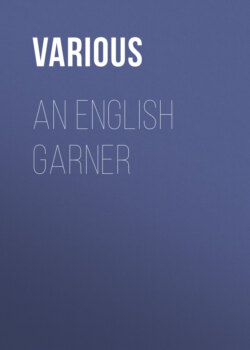Читать книгу An English Garner - Various - Страница 13
На сайте Литреса книга снята с продажи.
TO THE READER.
ОглавлениеThere is none more sensible than I am, how great a charity the most Ingenious may need, that expose their private wit to a public judgement; since the same Phancy from whence the thoughts proceed, must probably be kind to its own issue. This renders men no perfecter judges of their own writings, than fathers are of their own children: who find out that wit in them, which another discerns not; and see not those errors, which are evident to the unconcerned. Nor is this Self Kindness more fatal to men in their writings, than in their actions; every man being a greater flatterer to himself, than he knows how to be to another: otherwise, it were impossible that things of such distant natures, should find their own authors so equally kind in their affections to them; and men so different in parts and virtues, should rest equally contented in their own opinions.
This apprehension, added to that greater [one] which I have of my own weakness, may, I hope, incline the Reader to believe me, when I assure him that these follies were made public, as much against my inclination as judgement. But, being pursued with so many solicitations of Mr. HERRINGMAN's [the Publisher], and having received civilities from him, if it were possible, exceeding his importunities: I, at last, yielded to prefer that which he believed his interest; before that, which I apprehended my own disadvantage. Considering withal, that he might pretend, It would be a real loss to him: and could be but an imaginary prejudice to me: since things of this nature, though never so excellent, or never so mean, have seldom proved the foundation of men's new built fortunes, or the ruin of their old. It being the fate of Poetry, though of no other good parts, to be wholly separated from Interest: and there are few that know me but will easily believe, I am not much concerned in an unprofitable Reputation.
This clear account I have given the Reader, of this seeming contradiction, to offer that to the World which I dislike myself: and, in all things, I have no greater an ambition than to be believed [to be] a Person, that would rather be unkind to myself, than ungrateful to others.
I have made this excuse for myself. I offer none for my writings; but freely leave the Reader to condemn that which has received my sentence already.
Yet, I shall presume to say something in the justification of our nation's Plays, though not of my own: since, in my judgement, without being partial to my country, I do really prefer our Plays as much before any other nation's; as I do the best of ours before my own.
The manner of the Stage Entertainments has differed in all Ages; and, as it has increased in use, it has enlarged itself in business. The general manner of Plays among the Ancients we find in SENECA's Tragedies, for serious subjects; and in TERENCE and PLAUTUS, for the comical. In which latter, we see some pretences to Plots; though certainly short of what we have seen in some of Mr. [BEN.] JOHNSON's Plays. And for their Wit, especially PLAUTUS, I suppose it suited much better in those days, than it would do in ours. For were their Plays strictly translated, and presented on our Stage; they would hardly bring as many audiences as they have now admirers.
The serious Plays were anciently composed of Speeches and Choruses; where all things are Related, but no matter of fact Presented on the Stage. This pattern, the French do, at this time, nearly follow: only leaving out the Chorus, making up their Plays with almost Entire and Discoursive Scenes; presenting the business in Relations [p. 535]. This way has very much affected some of our nation, who possibly believe well of it, more upon the account that what the French do ought to be a fashion, than upon the reason of the thing.
It is first necessary to consider, Why, probably, the compositions of the Ancients, especially in their serious Plays were after this manner? And it will be found, that the subjects they commonly chose, drave them upon the necessity; which were usually the most known stories and Fables [p. 522]. Accordingly, SENECA, making choice of MEDEA, HYPPOLITUS, and HERCULES OEtaeus, it was impossible to show MEDEA throwing old mangled AESON into her age-renewing caldron, or to present the scattered limbs of HYPPOLITUS upon the Stage, and show HERCULES burning upon his own funeral pile.
And this, the judicious HORACE clearly speaks of, in his Arte Poetica; where he says
Non tamen intus Digna geri, promes in scenam: multaque tolles Ex oculis, quae mox narret facundia praesens. Nec pueros coram populo MEDEA trucidet[8] Aut humana palam coquat extra nefarius ATREUS, Aut in avem PROGNE vertatur, CADMUS in anguem. Quodcunque ostendit mihi sic, incredulus odi.
So that it appears a fault to chose such Subjects for the Stage; but much greater, to affect that Method which those subjects enforce: and therefore the French seem much mistaken, who, without the necessity, sometimes commit the error. And this is as plainly decided by the same author, in his preceding word
Aut agitur res in Scenis aut acta refertur: Segnius irritant animos demissa per aurem; Quam quae sunt oculis subjecta fidelibus, et quae Ipse sibi tradit spectator.
By which, he directly declares his judgement, "That every thing makes more impression Presented, than Related." Nor, indeed, can any one rationally assert the contrary. For, if they affirm otherwise, they do, by consequence, maintain, That a whole Play might as well be Related, as Acted.
